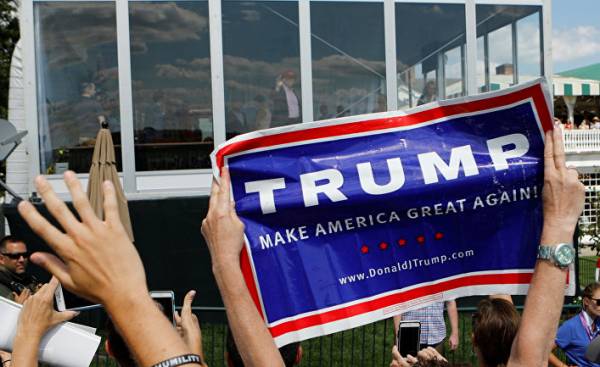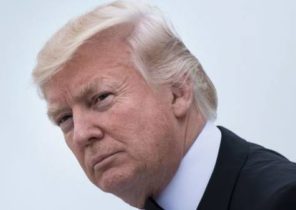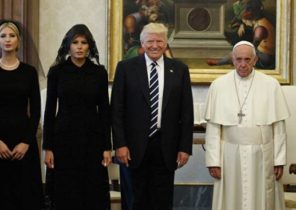
It’s been a whole week since meeting Donald trump with Vladimir Putin at the G20 summit in Hamburg. And that was this week! Revelations about the meeting of the President’s son with a mysterious Russian lawyer in the past year have cast a shadow on his administration. During the election campaign made itself felt at least recklessness and inexperience in relation to the cooperation with a country that wants to hurt us. Supporters of the administration trump foaming at the mouth argue that in this meeting there was nothing illegal, and even try to argue that anyone else should have a finger in the pie. But it is clear that President trump was on the territory of bill Clinton with his denials (“it All depends on what is the meaning of the word “collusion””). And in the air there was a clear feeling that the scandal is just beginning.
However, the contours of Russian policy of the Cabinet of trump give reason for cautious optimism. As I wrote a week ago, Donald trump and Rex Tillerson started negotiations with a much stronger trump card than we think, and they went with them without losing.
Not to say that the Hamburg meeting face to face was smooth — it is not. In the wilds of the machine of negotiations have brought someone, and the commander, making it with total recklessness. However, things could be worse. Much worse.
Most journalists focused on the discussion of Putin and trump to intervene in elections on whether “recognized” or not President trump refutation of Putin. In General, the trump during the talks looked pretty weak conciliator, to exert the maximum effort for the continued depersonalization of confrontation. Their questions to Putin, he was asked on the basis of “concerns of the American people.” Tillerson, who told reporters later about the details of the meeting, tried to describe it as a manifestation of the irreconcilable differences in views, but said that both parties want to “move on”. But it is indicative that came out of this attempt to “move on”.
After the meeting it was announced that two specific achievements. The first is a limited ceasefire in the South-West of Syria (and apparently agreed without the participation of the Pentagon), the details of which remain unclear and still to be announced. The second is the possibility of creating something that the President, the trump called “the indestructible unit of cybersecurity”. A week has passed. The first arrangement is more or less valid. And the second one broke within a few hours after President trump triumphantly announced it on Twitter.
It remains a mystery what trump and Putin discussed on the topic of cybersecurity. Watching the Kremlin’s astute columnist Leonid Bershidsky said Putin was able to put forward the idea of creating some kind of channel to solve problems of cybersecurity. It’s quite a sensible idea, considering that in cyberwarfare there are almost no rules. Full of enthusiasm trump, who is infatuated with the term “forward”, could see in this sentence that it was not, however, the management of intelligence strongly pointed out to him that this plan is doomed to failure, being not what it seems.
But other issues trump has to hold their positions. Before the meeting have circulated assumptions about what the United States will return the so-called “giving”, or the Russian real estate, which the Obama administration has seized in the last days of its work, thus avenging Russia for meddling in the election — and do it as a goodwill gesture. But this did not happen, which is quite remarkable.
As for the lifting of sanctions imposed against Russia for its actions in Ukraine, apparently, the issue was raised but not discussed in detail. It seems that it remains linked to a final settlement of the crisis in one form or another. Last Friday, many are talking about that the administration trump is going to conduct hard bargaining, as evidenced by the appointment of Kurt Volker’s special representative. Indeed, after the Hamburg summit, Secretary Rex Tillerson went to Kiev and met with President Petro Poroshenko and said: “Sanctions against Russia will be saved as long as Moscow will not refuse from the actions that caused the introduction of these sanctions.” This is a clear allusion to the return of the Crimea.
So what happens backstage? In the White house there is definitely a faction, which certainly includes the President himself, who is determined to normalize relations with Russia as soon as possible and how bigger.
Assistant trump Sebastian Gorka (Sebastian Gorka), speaking yesterday on CNN, said the administration still is considering the return of the “cottages”, intending thereby to conciliate Russia. It is easy to understand why this question was in the agenda. Russian does not need new motives and incentives. In the end, we have a lot of things that Russians want — but they don’t have it. In the fight against ISIS (banned in Russia organization — approx. TRANS.), their help would be nice, but in the end, it is not required. (Moscow subsequently necessarily involved in the stabilization of Syria, and therefore warm relationship in this case is optional). As for Afghanistan, North Korea and the Western Balkans, the Russians here — no more than an irritant and destructive force. For several years under President Obama, and six months under President trump the United States has demonstrated admirable restraint in the face of such provocations. If the Russians want to start talks on improving relations, gestures of good will must come from the Kremlin.
There is an increased temptation to ascribe dubious motives to President Trump, who’s quixotic generosity manifests in relation to Putin. Even a member of his Cabinet for Rex Tillerson, who is very warm relations with Putin, was noticeably stunned by the phrase trump at the beginning of the discussion with the Russian President to intervene in the elections: “Let’s make it so that it didn’t hurt”.
But despite all this, despite the obvious partiality of the President, the hard line towards Russia remains. Trip Tillerson in Kiev did not leave much room for maneuver on the issue of Crimea. A 40-percent increase in military spending on the established under Obama’s Initiative to ensure European security in the budget in 2018 and sequestration this program will not apply. The administration is determined to help Europe to diversify energy imports, to reduce dependence on Russia. To this end, it is pushing Europe to the development of the LNG infrastructure through a number of programs such as “Initiative of the three seas”, as well as through sanctions targeting Russia’s pipeline expansion in the continent. To bring his idea to Putin in a language he understands, the administration trump has announced that all of Europe, including Ukraine, is “a privileged sphere of American interests.”
Moscow the signal is realized, and the initial enthusiasm for the summit in Hamburg a little tempered. The Kremlin prepares to expel more than 30 American diplomats and the arrest of an American diplomatic property in Moscow. The last attempt to discuss this issue is scheduled for early next week, however, dissatisfied with the Kremlin demands the unconditional return of their property, stating that further negotiations are possible only after this step. Are even talking about the fact that Russia will veto the UN proposal on new sanctions against North Korea on the grounds that, according to Russian analysts, during the last North Korean test was not launched Intercontinental ballistic missile.
All and particularly the administration, with its pragmatic attitude on the principle of mutual concessions, it should be clear that we must not give in to these childish demands. Speaking yesterday to journalists on the sanctions in connection with Ukraine, trump himself said: “Why do I have to remove the sanctions without getting anything in return?” Nevertheless, we are discussing unilateral concessions, doing it in a different context.
The paradox lies in the fact that the Cabinet trump has managed to develop quite a solid strategy, even in spite of their leader. Obama’s man in Russia and a critic of trump’s Mike McFaul praised recently in the New York Times article, General Herbert McMaster and Gary Cohn (Gary Cohn). “I wish it was a REAL policy,” he wrote on Twitter. It actually looks like in real politics. I agree with her trump is another matter entirely.







